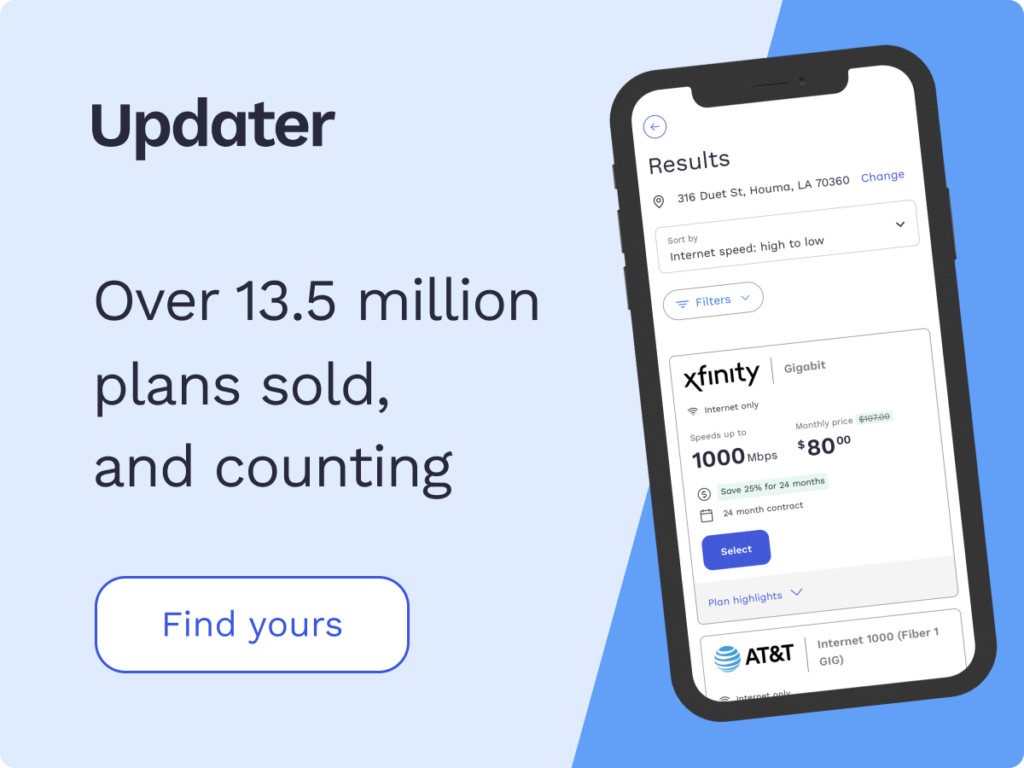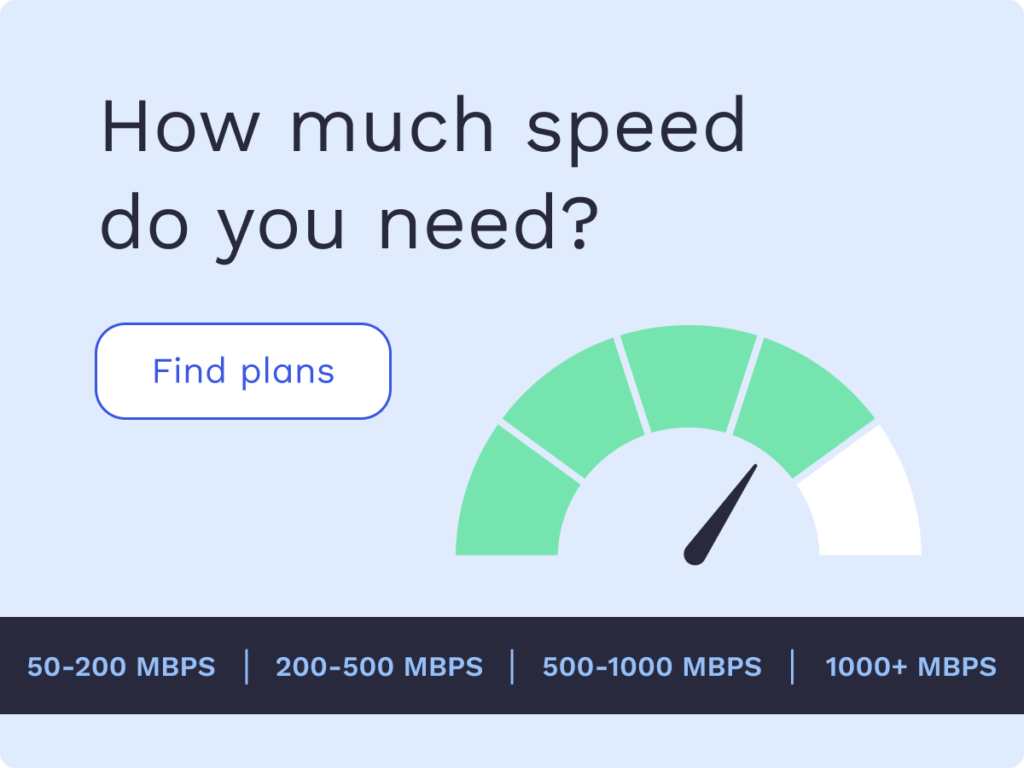How to Switch Internet Providers

With dozens of internet service providers (ISPs) to choose from, there’s no shortage of reasons to look into changing your service. Moving to a new home in an area that your previous provider doesn’t cover is one common reason. But you might also opt to switch to get faster speeds, lower prices, or better customer service.
If you’re tied to a contract, you’ll first need to cancel your service and pay any early termination fees. Before you do that, you need to decide on a new provider and set up your new service to avoid having to go without internet access while in-between providers.
No matter what your reason is for deciding to switch internet providers, we can help. We’ve gathered information about the process of canceling your current ISP as well as all of the key factors to consider so that you feel confident in your decision before signing your next contract.
- When should you switch internet providers?
- Paying cancellation fees
- Finding your new internet service provider
- Consider customer service ratings
- Signing a new internet contract
- Switching internet providers
When should you switch internet providers?
Faster internet
Not all ISPs are created equal when it comes to internet package/plan options. And with companies like AT&T and Google Fiber now offering speeds of 2Gbps to 5Gbps in select (but expanding) areas, if you have the need for speed and your current ISP doesn’t have what you’re looking for, maybe it’s time to make a switch.
New ISP options
Although some areas have very limited ISP options, many providers are constantly working on expanding their service areas. If you’re in an area that has a new ISP option (and perhaps other features that get your attention like faster speeds or lower prices), this could be a great reason to switch internet providers.
Better prices
If you’re past the introductory period with your current ISP and prices have gone up, or you’ve found that with all the additional fees your monthly price is a lot higher than you realized, you may be curious about what other options are available. Which is fair! Internet can be quite expensive and searching for a better price is a very valid reason to change internet providers.
Better (or no) contract terms
Being locked into long-term contracts is probably not an ideal situation for most people. The good news is that a lot of ISPs are starting to offer month-to-month options so you can avoid contract commitments. But that also means you have to break free from the one you’re already in before you switch. Don’t worry, though; we’ll cover how to do that so you can switch internet providers like a pro.
Better customer service
Sometimes fast speeds and prices don’t mean much if you’re frustrated with the customer service behind the scenes. Billing issues, tech issues, or struggling to get answers can be more hassle than they’re worth and more than enough to pique your curiosity about a new internet provider.
Whatever the driving reason is behind your decision to switch broadband providers, the first step will be to determine the cost of canceling with your current provider.
Paying cancellation fees
Not sure what to expect with your ISP if you cancel your contract? We’ve gathered cancellation fees for some of the top ISPs to give you an idea as to what costs you should plan for when switching.
*For providers that charge cancellation fees, the amount will depend on how many months are left in your contract at the time of cancellation. You’ll need to check with your provider before canceling in order to find out the exact amount owed.
Also remember that when you cancel your service, it is important to turn in any equipment that was provided to you by your ISP. Otherwise, you may be responsible for equipment non-return fees, which in some cases can be hundreds of dollars per device.
Finding your new internet service provider
Before deciding which internet provider to switch to, there are some key things to consider.
Determine which options are available in your area
Have your eye on that 2Gbps plan with Google Fiber or a contract-free internet option from AT&T? Unfortunately, if those providers aren’t available in your area, they won’t be an option unless you move into their service area. So, the first thing you need to determine before researching providers to switch to is which ISPs are available in your area.
Determine your budget
Once you know which provider plans are potential options for you, you’ll need to determine your budget. Remember to keep in mind that the initial price you’re getting may be a promotional price that will increase after a period of time. If this is the case, be sure to find out how long the promotional price lasts and how much the price increase will be when the promotional period ends.
How much speed do you need?
While it may be tempting to opt for the highest speed plan you can get, faster speeds will almost always come with a higher cost. If you don’t want to pay for more internet than you actually need, how do you know what the right plan is for you?
As recently as a few years ago, calculating how much internet speed was right for a household was based on the number of people. For instance, 25Mbps per person was usually the standard. These days, calculations are based more on the number of devices and what they’re being used for. For example, it’s not unusual for one person to be streaming a 4K movie, working on their laptop, and opening emails on their phone at the same time, which may require more than 25Mbps.
To help you better understand your potential internet usage, these are the recommended bandwidth needs for some common online activities:
- Surfing the web: 5-10Mbps
- Browsing social media: 10Mbps
- Videoconferencing: 10-20Mbps
- Online gaming: 25-35Mbps
- Streaming HD: 10-20Mbps
- Streaming 4K: 35Mbps
- Smart home devices: 10-12Mbps each
Consider making a list of all of the devices in your home and what they are doing at any given time to have a better understanding of what speed plan will be best fit your overall needs for bandwidth.
Be aware of additional costs
If your reason for switching internet providers is budget-related, then you’re probably well aware of additional fees/costs. Remember to consider additional costs that aren’t necessarily advertised before making a switch, including:
Monthly equipment rental fees
When you sign up for internet service, you may be provided with equipment that you’ll have to pay a monthly rental fee for. This varies by ISP and some will allow you to provide your own equipment to save on monthly fees.
Data overages
Some ISPs put data caps on their plans. This means you may have to pay data overage fees if you exceed your monthly data limit. Many ISPs with overage fees charge about $10 for every additional 50GB of data you use. If you’re concerned about overage charges, make sure you opt for a speed plan that will fit your needs or look for a plan with no data limits.
Early termination charges
Many ISPs are moving away from long-term contracts, while others require 12-24 month agreements in order to lock in promotional prices. If you’re concerned that you won’t be able to fulfill a long-term contract, look for options that will allow you to go month-to-month.
Ask about contract buyout options
In the same way that mobile phone companies sometimes offer to buy out your existing cell phone contract in order to encourage you to switch, there is a possibility that your new ISP will buy out your existing contract, too. Companies including Verizon, Spectrum, and Suddenlink may pay up to $500 to your existing provider to fulfill your contract.
Consider customer service ratings
Having an unpleasant customer service experience with any company can be difficult and frustrating. So if customer service is important to you, vetting an ISP’s customer service ratings can be important. Luckily, there are a few industry experts who’ve done the work for you.
A recent review of the Best Internet Service Providers of 2022 by CNET named Verizon best for customer care. A recent J.D. Power & Associates Internet Service Provider Satisfaction Study also named Verizon best overall, followed by Xfinity, Cox, Spectrum, Optimum, and Frontier.
Signing a new internet contract
Before you switch internet providers and sign a new contract, the following tips will help you with the process so that you can feel confident with your decision.
Look for the additional fees
While the advertised introductory prices of ISPs can be very enticing, make sure you dig a little deeper to understand additional fees. Fees like installation fees, equipment rental fees, and data overage fees can add up quickly. Also, make sure you understand how long the introductory period lasts and what the price will be after it ends.
Find out if you can provide your own equipment
If you are able to use your own equipment, this could save you money in the long run because you’ll own the equipment outright versus paying monthly for a rental. Each ISP has specific rules about compatible equipment, so make sure you verify with them prior to signing your contract.
Research your options
Remember, that introductory price might not be so enticing if there are a bunch of other fees that will get tacked on or if you have to commit to a long-term contract. You may find that a higher upfront price with fewer fees ends up being the better choice. Doing your research now could potentially save you a lot of headaches later.
Consider bundling
Many ISPs also have home phone and television options. Sometimes bundling services can save you money in the short and long term, as long as the price hike isn’t too steep after any promotions end.
Ask for discounts
If the internet provider you are considering doesn’t offer introductory prices or bundles, ask them if they will. Remember, they are trying to win your business, so you are the one with more leverage for negotiating prices and discounts.
Switching internet providers
Internet service is becoming more and more of a necessity as households become more dependent on it. From surfing the web and streaming movies to working from home or attending school online, having affordable, reliable, and fast internet service is a must. But if you’ve found yourself in a situation where you’re unhappy with your ISP due to price, slow speeds, or poor customer service, or if you’re moving somewhere and can’t take your current provider with you, choosing a new ISP can be a big task.
The key to switching internet providers lies in understanding a few key factors. First, find out if you’re locked into a contract and what cancellation fees you might be responsible for. Next, find out who the service providers are in your area as well as the plans they offer. Be sure to thoroughly research added fees so you have a full understanding of how much your bill will be on a monthly basis. Consider ways to cut costs, like self-installing your service and buying your own modem so you don’t have to pay monthly equipment rental fees. And don’t be afraid to ask for promotions or discounts.
In the long run, if you do the research and ask the right questions, you’ll have the right internet service provider with the right speed and the right price.
*Pricing varies by location and availability. Speeds may vary. All prices subject to change; for current pricing and availability visit our internet service page. Prices as of 3/24/22.
Disclosure | Updater articles are based on our own data and research, independent from partner relationships. We are not compensated by partners for information and opinions presented here. Our Editorial Terms of Service can be found here.














